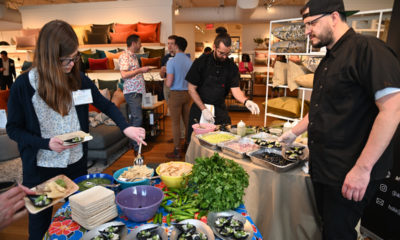Sports
Challenges of organizing local sports leagues
Permit process, lack of fields often vex D.C. players
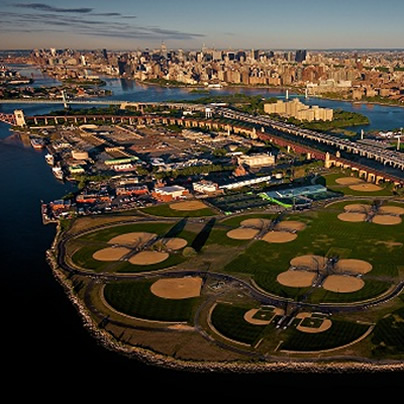
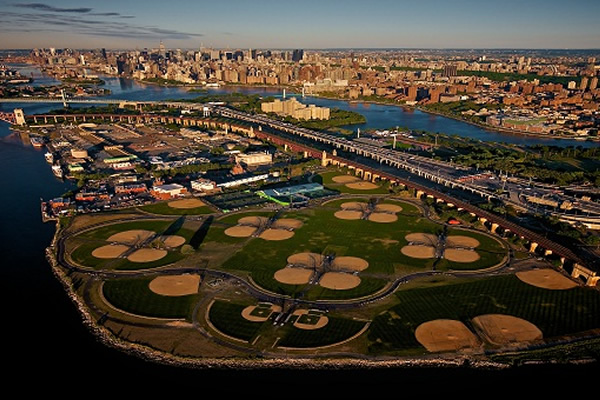
New York City created a 273-acre local sports and recreational playground floating on the East River. Could D.C. find similar space for its local amateur athletes? (Photo courtesy of the Randall’s Island Park Alliance)
D.C. is home to one of the largest and most organized LGBT sports communities in the world. The list of LGBT local sports teams has grown to more than 30 clubs and the athlete base is well over 3,000 members.
Those kinds of numbers would not be possible without the leadership that is demonstrated by members of each of the clubs.
But the success of local organizers doesn’t mean they don’t encounter obstacles to growth. Some of the challenges facing them include lack of playing space, high costs for space, accessibility and the local permit process.
FIND MORE OF THE WASHINGTON BLADE SPORTS ISSUE HERE.
The permit process, especially for a new team forming, can cause major frustration for those not familiar with the process. There are cross-jurisdictional issues and some of the entities that may present a challenge are the National Park Service, the D.C. Department of Parks and Recreation, the Department of General Services Realty Office as well as the facility or school that the space sits on.
One person who knows the permit process well is Alex Bearman, executive director of District Sports who manages leagues and playing space for 240 primarily straight soccer teams at 15 different locations in the area.
District Sports primarily uses playing fields that are run by schools, which means that their process includes being approved by the athletic director, the vice principal or the principal. “There is a lot of hand-holding, showing up and talking,” says Bearman. “You can make it through the permit process and then be turned down by the facility because there are just not enough incentives for the facility to offer their space. There is also the added cost of paying for a maintenance man to be on site.”
Nick Napolitano leads the permit process for the Federal Triangles Soccer Club and agrees that the schools do not have enough incentives to risk having their fields torn up by an adult sports league.
“You really have to establish a relationship with the school principal and prove that you will respect the condition of their field,” says Napolitano. “In the past we have had to enlist the help of D.C. Council member Jim Graham just to get our foot in the door. Even when you get to that point, it is still hard to budget for the fees as they can fluctuate.”
When the DC Gay Flag Football League (DCGFFL) began, it targeted the fields near the FDR Memorial as their home base and came up with no results during the permit process.
“We ended up going through our roster of players just to find someone who knew someone or at least knew the process,” says JJ Johnson, league commissioner. “Even after securing the spot, we were still confronted by a park ranger on the first day.”
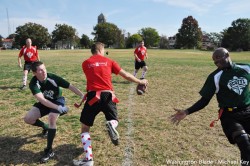
D.C. Gay Flag Football plays at Carter Barron Fields. (Washington Blade photo by Michael Key)
The DCGFFL outgrew that field almost immediately and is now ensconced at the Carter Barron Fields on Sundays. The group considers themselves lucky to have access to such a large amount of space as they have grown to 276 players.
Carter Barron is federally owned, administered by the National Park Service, and permitted by the DC Department of Parks and Recreation.
“It was very confusing at first,” says Johnson. “We now show up at the permit office several times a year just to shake hands and chit chat. We want them to know who we are and that we are appreciative.”
Martin Espinoza of Stonewall Kickball agrees that the permit process can be stressful as the kickball league faces two permit renewals each year. They generally have their calendar set up for the upcoming season without knowing if their permit will be renewed. To be safe, league registration is always scheduled after the permit approval date.
Currently, the kickball league plays on Sundays at Stead Park Field. When the club started in 2010, the city was not allowing use of Stead Park on Sundays. “We were very fortunate,” admits Espinoza. “The city made an exception to allow us to play on Sundays.”
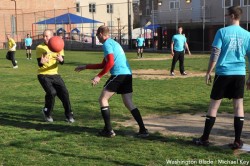
A gay kickball league is among the groups that make use of Stead Park. (Washington Blade photo by Michael Key)
Stonewall Kickball has seen incredible growth since its inception with a current member list of 550 players. Because they were unable to secure a permit for an additional night, they have spilled over into the predominately straight DC Kickball League, which holds the permit for Thursday nights at Stead Park Field.
“We are hoping to grow this season by securing additional time on Sundays,” says Espinoza. “Even though we arrive at the permit office with all of our paperwork on the first day of renewal, it is still a waiting game. Youth, senior and city programs are looked at first. Adult sports come last.”
Stonewall Kickball will face another obstacle in 2014 when the $1.6 million renovation of Stead Park Field will begin. It is unclear at this time whether they will have a place to play or not.
In March of 2013, a new LGBT sports team joined the fray in the struggle for playing space. The Washington Scandals Rugby Club has not yet found a field to call home. Being new to the process, they are running into the same obstacles that seem to plague all new sports teams.
“We have been looking for space on weeknights in the District and there is nothing available for adult sports groups,” says Arc Riley of the Scandals. “The field we are practicing on is so small that half of our 40 players are standing on the sidelines while the other half practice.”
The struggle with getting a response from the Department of Parks and Recreation has led the Scandals to start looking for space in Montgomery County for the winter months. “We are hoping to be back in the District by spring,” says a hopeful Riley.
Faced with a similar space shortage back in the 1990s, New York City, along with the Randall’s Island Park Alliance (RIPA) created a 273-acre sports and recreational playground floating on the East River.
Randall’s Island boasts more than 60 sports fields, accommodating sports such as soccer, baseball, softball, lacrosse, field hockey and rugby. Also included on the island is a world-class track stadium, a tennis center, golf facilities as well as cultural and natural areas.
Formerly used over the centuries for a range of public facilities including a boy’s home, a hospital, and a home for Civil War veterans, the island was first designated as a park in 1936 by Franklin Delano Roosevelt. By the early 1990s it was in serious disrepair.
RIPA was formed in 1992 as a 501c3 non-profit organization to work with New York and local communities to transform the island. Today, Randall’s Island is New York’s premier recreational destination and home to dozens of sports leagues for youth, adult, senior and the LGBT sports communities.
The bottom line in the D.C. area is that although the permit process can be tedious, the lack of playing space is the primary obstacle in accommodating the ever-growing sports community. The overwhelming success of the Long Bridge Park sports complex in Arlington in November 2011 is a perfect example of the need for more sports space in the area.
The possibility of 190 acres opening up in the future at Metro accessible RFK Stadium is giving many in the sports community dreams of a dedicated sports complex in Prince George’s County.
RFK Sports Park anyone?
Sports
Bisexual former umpire sues Major League Baseball for sexual harassment
Brandon Cooper claims female colleague sexually harassed him
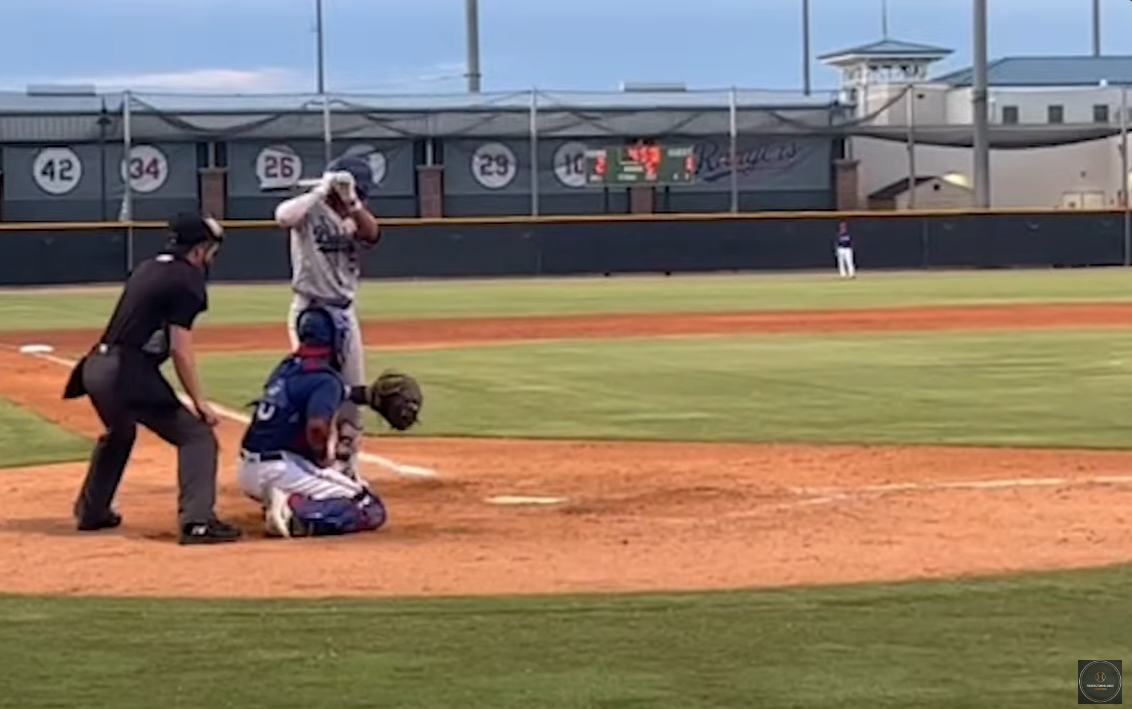
A fired former umpire is suing Major League Baseball, claiming he was sexually harassed by a female umpire and discriminated against because of his gender and his sexual orientation.
Brandon Cooper worked in the minor league Arizona Complex League last year, and according to the lawsuit he filed Wednesday in federal court in Manhattan, he identifies as bisexual.
“I wanted my umpiring and ability to speak for itself and not to be labeled as ‘Brandon Cooper the bisexual umpire,’” he told Outsports. “I didn’t want to be labeled as something. It has been a passion of mine to simply make it to the Major Leagues.”
But that didn’t happen. Instead of being promoted, he was fired. His suit names MLB and an affiliated entity, PDL Blue, Inc., and alleges he had endured a hostile work environment and wrongful termination and/or retaliation because of gender and sexual orientation under New York State and New York City law.
“Historically the MLB has had a homogenous roster of umpires working in both the minor and major leagues,” Cooper claims in his suit. “Specifically, to date there has never been a woman who has worked in a (regular) season game played in the majors, and most umpires are still Caucasian men. To try to fix its gender and racial diversity issue, defendants have implemented an illegal diversity quota requiring that women be promoted regardless of merit.”
Cooper claims former umpire Ed Rapuano, now an umpire evaluator, and Darren Spagnardi, an umpire development supervisor, told him in January 2023 that MLB had a hiring quota, requiring that at least two women be among 10 new hires.
According to the suit, Cooper was assigned to spring training last year and was notified by the senior manager of umpire administration, Dusty Dellinger, that even though he received a high rating in June from former big league umpire Jim Reynolds, now an umpire supervisor, that women and minority candidates had to be hired first.
Cooper claims that upon learning Cooper was bisexual, fellow umpire Gina Quartararo insulted him and fellow umpire Kevin Bruno by using homophobic slurs and crude remarks. At that time, Quartararo and Cooper worked on the same umpiring crew and being evaluated for possible promotion to the big leagues.
This season, Quartararo is working as an umpire in the Florida State League, one of nine women who are working as minor league umpires.
Cooper said he notified Dellinger, but instead of taking action against Quartararo, he said MLB ordered Cooper to undergo sensitivity training. According to his lawsuit, he was also accused of violating the minor league anti-discrimination and harassment policy.
Cooper’s suit says he met with MLB Senior Vice President of Diversity, Equity and Inclusion Billy Bean — who the Los Angeles Blade reported in December is battling cancer.
The lawsuit says at that meeting, Bean told the umpire that Quartararo claimed she was the victim, as the only female umpire in the ACL. Cooper said he told Bean Quartararo regularly used homophobic slurs and at one point physically shoved him. He also claims that he has video evidence, texts and emails to prove his claim.
But he said his complaints to Major League Baseball officials were ignored. His lawsuit said MLB passed him over for the playoffs and fired him in October. He said of the 26 umpires hired with Cooper, he was the only one let go.
Through a spokesperson, MLB declined to comment on pending litigation. Quartararo has also not publicly commented on the lawsuit.
Sports
Brittney Griner, wife expecting first child
WNBA star released from Russian gulag in December 2022
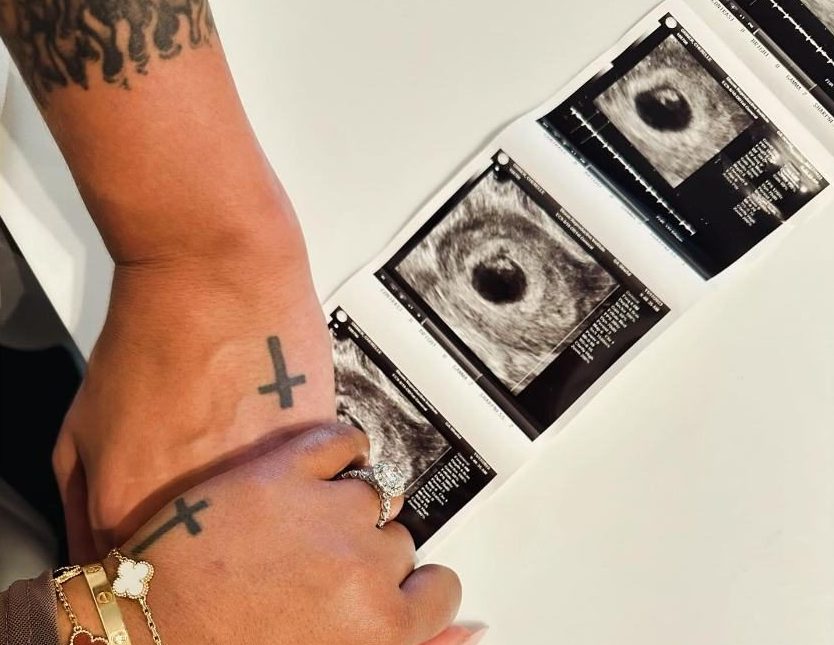
One year after returning to the WNBA after her release from a Russian gulag and declaring, “I’m never playing overseas again,” Phoenix Mercury star Brittney Griner and her wife announced they have something even bigger coming up this summer.
Cherelle, 31, and Brittney, 33, are expecting their first child in July. The couple shared the news with their 715,000 followers on Instagram.
“Can’t believe we’re less than three months away from meeting our favorite human being,” the caption read, with the hashtag, #BabyGrinerComingSoon and #July2024.
Griner returned to the U.S. in December 2022 in a prisoner swap, more than nine months after being arrested in Moscow for possession of vape cartridges containing prescription cannabis.
In April 2023, at her first news conference following her release, the two-time Olympic gold medalist made only one exception to her vow to never play overseas again: To return to the Summer Olympic Games, which will be played in Paris starting in July, the same month “Baby Griner” is due. “The only time I would want to would be to represent the USA,” she said last year.
Given that the unrestricted free agent is on the roster of both Team USA and her WNBA team, it’s not immediately clear where Griner will be when their first child arrives.
The Griners purchased their “forever home” in Phoenix just last year.
“Phoenix is home,” Griner said at the Mercury’s end-of-season media day, according to ESPN. “Me and my wife literally just got a place. This is it.”
As the Los Angeles Blade reported last December, Griner is working with Good Morning America anchor Robin Roberts — like Griner, a married lesbian — on an ESPN television documentary as well as a television series for ABC about her life story. Cherelle is executive producer of these projects.
Next month, Griner’s tell-all memoir of her Russian incarceration will be published by Penguin Random House. It’s titled “Coming Home” and the hardcover hits bookstores on May 7.
Sports
Applause and criticism for Staley’s trans-inclusive stance
South Carolina Gamecocks women’s coach made comments on Sunday
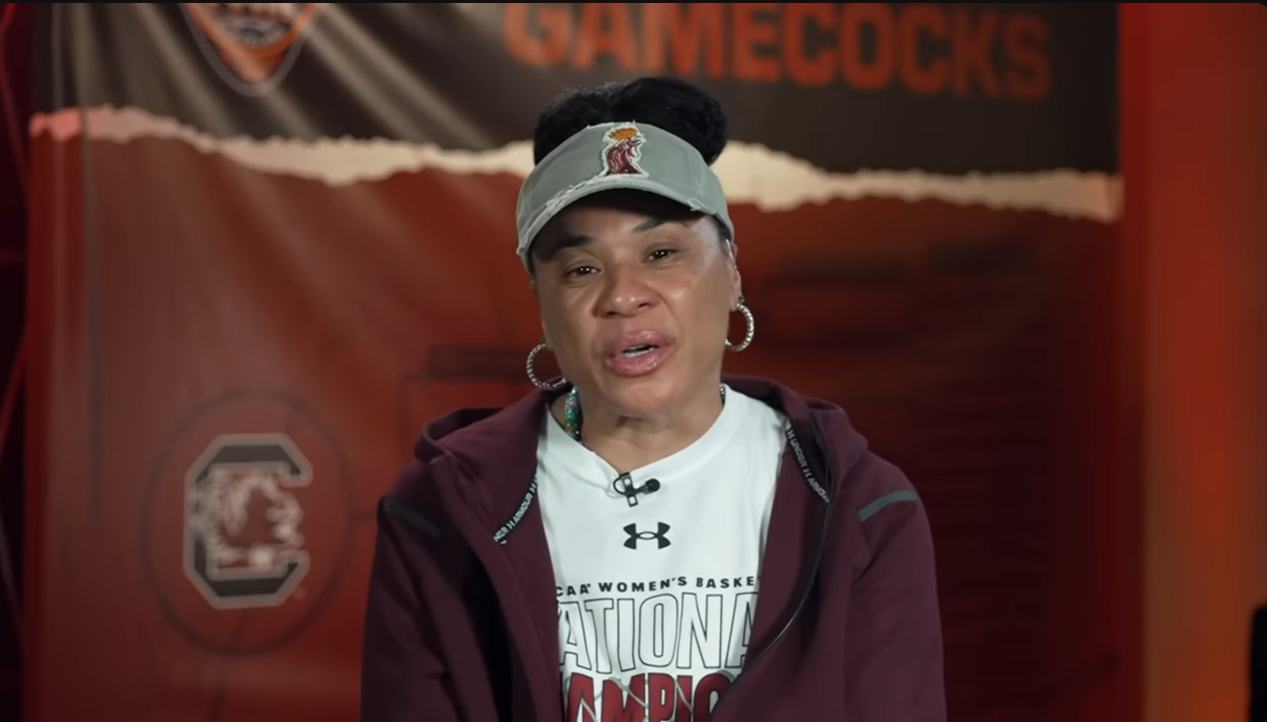
If not for a conservative transphobic blogger, this moment should be a celebration of NCAA women’s basketball coach Dawn Staley and the women of the South Carolina Gamecocks.
On Sunday, they concluded their undefeated season with a decisive win and a championship title. But when Staley faced reporters before that big game, Outkick’s Dan Zakheske asked her an irrelevant, clickbait question about transgender women in sports, referring to them as “biological males.”
Staley could have ignored the question, or stated she had no opinion, but instead the legendary coach offered a crystal clear endorsement of trans women competing in women’s sports, something outlawed in her home state of South Carolina for girls in kindergarten through college.
“I’m of the opinion,” said Staley, “If you’re a woman, you should play. If you consider yourself a woman and you want to play sports or vice versa, you should be able to play. That’s my opinion.”
Zakheske clearly wasn’t satisfied with that declaration of allyship and Staley swiftly cut him off.
“You want me to go deeper?” she asked.
“Do you think transgender women should be able to participate,” he started to say, when the coach stole the ball and took it downtown on a fastbreak. “That’s the question you want to ask? I’ll give you that. Yes. Yes. So, now the barnstormer people are going to flood my timeline and be a distraction to me on one of the biggest days of our game, and I’m okay with that. I really am.”
Staley is herself a Hall of Fame player a leading voice for diversity.
Reaction to her comments were swift, from LGBTQ rights organizations, athletes and inclusion opponents.
“Coach Staley simply spoke the truth that trans women are women and should play if they want,” said Sarah Kate Ellis, president and CEO of GLAAD, in a post on Instagram. “All of us can take a page from Coach Staley’s playbook as a sports leader and as a person of high integrity guided by faith, compassion and common sense.”
A White House pool reporter revealed President Joe Biden called Staley Sunday evening to congratulate her and the Gamecocks on their championship win. But it’s not clear if she and the president, an outspoken supporter of trans rights, discussed her remarks on trans athletes.
A number of Black leaders in the LGBTQ movement applauded Staley for taking a stand.
“Coach Staley has always been a trailblazer, but she’s also shown that true leadership is about advancing justice and equality for everyone,” said Human Rights Campaign President Kelley Robinson. “By expressing her full-throated support for transgender athletes’ inclusion in sports, she’s sending an important message — our shared humanity matters.
“Coach Staley showed courage and vulnerability, in choosing to answer the question and make a powerful statement of support for trans people on one of the biggest days and biggest stages in sports history,” said Kierra Johnson, executive director of the National LGBTQ Task Force, in a statement. “Not only does that make her a leader we can all aspire to like, it makes her a class act. She has etched her legacy in the history books with her play, her coaching, her heart and her smarts.”
In congratulating Staley on her championship title victory, Dr. David J. Johns, the CEO and executive director of the National Black Justice Coalition, also commended her for “her unwavering advocacy and support for transgender people in sports.”
“In a time when transgender athetes face unjust scrutiny, discrimination and exclusion from the National Association of Intercollegiate Athletics, her courage to speak truth to power and in support of inclusion and fairness sets a powerful example for us all, and is a testament to her integrity and compassion.”
The NBJC leader was referring to Monday’s announcement by the NAIA, the governing body of athletic programs at small colleges nationwide, voting 20-0 to essentially ban trans women from competing with other women beginning Aug. 1, as ESPN reported.
“It is a shocking and devastating development that the NAIA, an organization that has done so much to open doors, is now slamming those doors shut on transgender athletes,” said Sasha Buchert, Lambda Legal’s senior attorney and director of the organization’s nonbinary and trans rights project.
“Instead of standing up in support of transgender young people, the NAIA has simply turned its back on them — permanently depriving them of the benefits of competition. Would that they had the courage of victorious University of South Carolina women’s basketball coach Dawn Staley, who didn’t miss a beat in clarifying that transgender women should be able to play.”
However, praise for Staley’s stance was not universal.
Riley Gaines, failed former college swimmer and paid shill for the anti-inclusion organization, Independent Women’s Forum, called Staley “entirely incompetent or a sell-out” on Fox News. “Personally, I don’t think she believes what she said.”
Gaines has turned her fifth-place tie with out trans NCAA champion Lia Thomas into a career as a crusader against inclusion and a former advisor to the presidential campaign of Florida Gov. Ron DeSantis.
Val Whiting, a former Stanford University and professional women’s basketball player, tweeted her strong disagreement with Staley. “A lot of my basketball sisters feel differently but trans women do not belong in women’s sports. It’s not fair nor safe for biological women. There has to be another solution for trans women to be able to compete athletically besides having them compete against biological women.”
A lot of my basketball sisters feel differently but trans women do not belong in women’s sports. It’s not fair nor safe for biological women. There has to be another solution for trans women to be able to compete athletically besides having them compete against biological women.
— Val Whiting (@iamcoachval) April 7, 2024
Zaksheske’s Outkick colleague, anti-trans pundit David Hookstead, also went all-in with a transphobic post.
“Dawn Staley says she supports men who identify as women competing against real women in sports. Her view could literally destroy women’s basketball forever. Why won’t more people stand up for women?”
Dawn Staley says she supports men who identify as women competing against real women in sports.
— David Hookstead (@dhookstead) April 6, 2024
Her view could literally destroy women’s basketball forever.
Why won’t more people stand up for women? pic.twitter.com/2A59KTqvHb
Hookstead then boasted that Staley blocked his account.
Republican South Carolina Congresswoman Nancy Mace retweeted Zaksheske’s account of his interaction with Staley, calling her support of trans athletes “absolute lunacy.” That in turn won praise from Caitlyn Jenner, who retweeted Whiting and posted her thanks to Mace, along with this comment: “There is nothing complicated about this issue!”
What is complicated is that Jenner has never explained why she has competed with cisgender women in golf ever since her transition almost a decade ago.
You’re a hypocrite. pic.twitter.com/42DKwA9jmF
— Art Candee 🍿🥤 (@ArtCandee) April 7, 2024
-

 State Department2 days ago
State Department2 days agoState Department releases annual human rights report
-

 Maryland4 days ago
Maryland4 days agoJoe Vogel campaign holds ‘Big Gay Canvass Kickoff’
-

 Politics3 days ago
Politics3 days agoSmithsonian staff concerned about future of LGBTQ programming amid GOP scrutiny
-

 The White House1 day ago
The White House1 day agoWhite House debuts action plan targeting pollutants in drinking water



